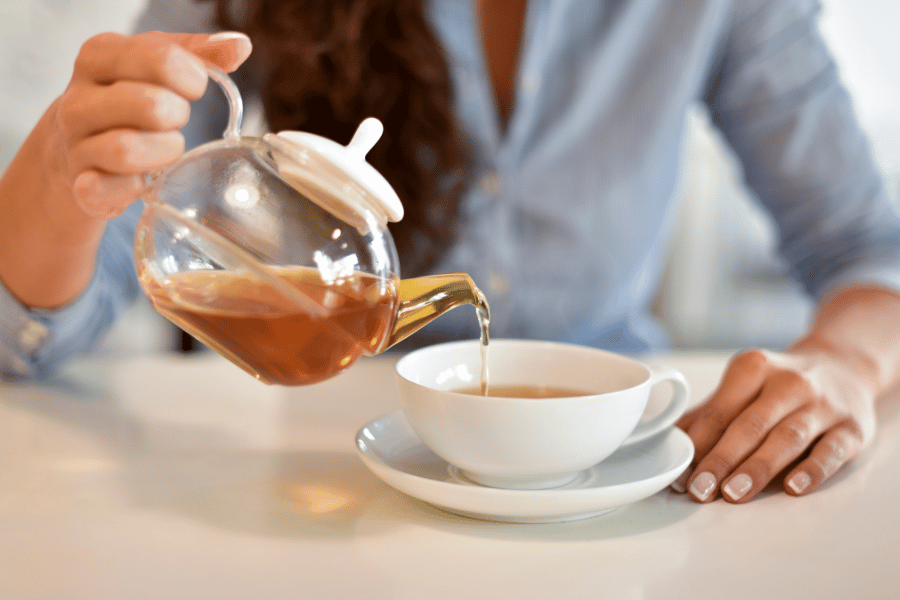Winter is a season that poses unique challenges and opportunities for health, particularly in the realm of weight management. The cold weather often leads to decreased physical activity and increased consumption of calorie-rich foods. However, it also presents an ideal opportunity to explore healthy, warming options that aid in weight loss and overall wellness. Among these options, green tea, known for its numerous health benefits, stands out, especially when it comes to weight loss. This article delves into finding the best quality green tea for weight loss during the winter season, combining traditional wisdom with modern research.

Benefits of Green Tea for Weight Loss
Green tea is celebrated globally for its health-enhancing properties, and among these, its effectiveness in weight management is particularly noteworthy. The primary reason green tea is effective for weight loss is its high concentration of catechins, powerful antioxidants. Notably, the catechin known as epigallocatechin gallate (EGCG) is linked to boosting metabolism and enhancing fat burning processes.
Research consistently shows that regular consumption of green tea can result in a modest but significant reduction in body fat and weight. A study published in the Journal of Nutrition demonstrated that participants who consumed green tea extract experienced greater fat oxidation than those who did not. This suggests that green tea not only helps in losing weight but also in maintaining a healthy body composition.
Moreover, green tea is known to improve insulin sensitivity and reduce blood sugar levels, which are crucial factors in weight management and overall health. Its mild caffeine content also aids in increasing energy expenditure and fat oxidation.
It’s important to note that the quality of green tea plays a pivotal role in harnessing these benefits. High-quality green tea tends to have higher concentrations of catechins and other beneficial compounds compared to lower-quality alternatives. Therefore, choosing the best quality green tea for weight loss is essential to maximize these health benefits, especially during the winter season when our bodies require extra care and nutrition.

Understanding Winter Wellness
The concept of winter wellness involves a comprehensive approach to maintaining and enhancing health during the colder months. It’s crucial for overall health, as the winter season often brings challenges such as reduced sunlight exposure, colder temperatures, and a tendency for less physical activity, all of which can impact physical and mental well-being.
Winter wellness is about adapting to these seasonal changes in a way that supports your health goals. For individuals focused on weight loss or weight management, this period can be particularly challenging. The colder weather can lead to a decrease in outdoor activities and an increase in the consumption of comfort foods, which are often high in calories and low in nutrients. This shift in lifestyle can negatively impact one’s fitness and weight loss objectives.
However, winter also offers unique opportunities to focus on indoor exercises, healthy comfort food alternatives, and warming beverages like green tea that support weight management. Understanding winter wellness is about recognizing these challenges and opportunities, and making informed choices that align with your health goals.
Incorporating green tea into your winter wellness routine can be a strategic move. Not only does it provide warmth and comfort during the cold days, but it also contributes positively to your weight loss efforts. The natural compounds found in green tea, such as catechins and caffeine, work together to help maintain a healthy metabolism, which can be slower during the winter months.
Embracing winter wellness means finding balance and integrating healthful practices that align with the season’s characteristics. It’s about making the most of what winter has to offer while staying true to your health and fitness goals.
Types of Green Tea
When it comes to selecting green tea for weight loss, especially during the winter, understanding the different types available in the market is crucial. Each variety offers unique flavors, aromas, and health benefits, making the choice both a matter of personal preference and health objectives.
- Sencha: This is the most popular type of green tea in Japan. Sencha has a refreshing, grassy, and slightly sweet flavor. It’s rich in antioxidants and has a moderate level of caffeine, making it a great everyday choice for weight loss and wellness.
- Matcha: Matcha is a powdered form of green tea and contains the entire leaf, which means it’s packed with antioxidants, including EGCG. Its high concentration of nutrients makes it an excellent choice for boosting metabolism and aiding in weight loss. Matcha has a unique, creamy texture and a rich, umami flavor.
- Gyokuro: Known as one of the highest-quality green teas, Gyokuro is shaded before harvest, resulting in increased chlorophyll and amino acid levels. This gives it a distinctive sweet flavor and a higher caffeine content. Gyokuro is particularly effective for weight loss due to its potent concentration of catechins.
- Dragon Well (Longjing): A renowned Chinese green tea, Dragon Well is known for its smooth, flat leaves and a mellow, slightly sweet flavor. It’s lower in caffeine but rich in antioxidants, making it a good choice for those sensitive to caffeine but still seeking weight loss benefits.
- Hojicha: This Japanese green tea is roasted over charcoal, giving it a unique, smoky flavor. Hojicha contains lower levels of caffeine and is easier on the stomach, making it a good evening choice.
- Genmaicha: A blend of green tea and roasted brown rice, Genmaicha offers a nutty flavor. It’s lower in caffeine and can be a good option for those looking for a milder tea for weight loss.
Selecting the right type of green tea for weight loss in winter depends on individual taste preferences, caffeine sensitivity, and specific health goals. High-quality versions of these teas will provide the most health benefits and aid in effective weight management during the colder months.

Factors for Evaluating Green Tea Quality
When assessing the quality of green tea, especially for weight loss purposes, several key factors should be considered. These factors not only influence the taste and aroma of the tea but also significantly impact its health benefits:
- Origin and Cultivation: The region where the green tea is grown plays a crucial role in its quality. Factors like soil quality, climate, and altitude all contribute to the tea’s flavor profile and antioxidant content. For instance, teas grown in shaded areas, like Gyokuro, tend to have higher levels of chlorophyll and amino acids.
- Harvesting Process: The time of harvest and the method used can affect the quality of green tea. First flush teas, which are the first pickings of the tea season, are generally considered the highest quality due to their delicate flavor and higher nutrient content.
- Processing Method: After harvesting, the processing method (steaming, pan-firing, rolling, and drying) influences the tea’s quality. Steaming, commonly used in Japanese green teas, helps in preserving the color and antioxidants, while pan-firing, used in Chinese green teas, gives a more roasted flavor.
- Appearance and Color: High-quality green tea leaves are typically uniform in size and shape. The color of the leaves should be vibrant green, indicating that the tea has been properly processed and stored.
- Freshness: Freshness is critical in determining the quality of green tea. Fresh tea has a more potent flavor and a higher concentration of antioxidants. Look for packaging dates, and choose the most recent ones.
- Taste and Aroma: The flavor profile should be clean and fresh, without any bitterness. A high-quality green tea will have a pleasant aroma and a balanced taste, reflecting its origin and processing.
- Catechin Content: For weight loss, the catechin content, particularly EGCG, is crucial. Higher-quality teas will generally have a higher concentration of these compounds.
By considering these factors, you can choose a green tea that not only supports your weight loss goals during the winter months but also provides a delightful sensory experience.
Best Practices for Brewing Green Tea in Winter
The way green tea is brewed can greatly affect its taste, aroma, and health benefits, especially in terms of aiding weight loss during winter. Here are some best practices to ensure that you extract the maximum benefits from your green tea:
- Water Temperature: Unlike black or oolong teas, green tea requires a lower brewing temperature to prevent bitterness and to preserve its delicate flavors and beneficial compounds. Ideally, the water temperature should be between 160°F to 180°F (70°C to 80°C). Using water that’s too hot can destroy the tea’s catechins.
- Tea Quality: Always start with high-quality green tea. As discussed in the previous section, factors such as origin, harvesting, and processing greatly influence the tea’s quality and effectiveness in weight loss.
- Quantity of Tea: The general recommendation is about one teaspoon of tea leaves per cup. However, this can vary based on personal taste preferences and the type of green tea. Matcha, for instance, might require a different approach due to its powdered form.
- Steeping Time: Green tea should not be steeped for too long as it can become bitter. A steeping time of 1-3 minutes is usually ideal, but this can vary depending on the type of green tea. Delicate teas like Gyokuro might need less time, while more robust teas like Hojicha might benefit from a slightly longer steep.
- Use of Fresh, Filtered Water: The quality of water used for brewing is just as important as the tea itself. Fresh, filtered water is preferable as it can enhance the natural flavors of the tea.
- Avoid Adding Sugar or Milk: To maximize the weight loss benefits of green tea, it’s best to avoid adding sugar or milk, which can add extra calories and diminish the health benefits.
- Consistency in Consumption: For weight loss, consistency is key. Regularly consuming green tea throughout the winter can help maintain metabolism and aid in fat burning.
- Mindful Enjoyment: Lastly, take the time to enjoy your tea. Mindfulness while drinking can enhance the experience and may contribute to a healthy, balanced approach to weight loss.
By following these brewing practices, you can ensure that your cup of green tea is not only a comforting ritual during the winter months but also a beneficial component of your weight loss strategy.

Reviews and Recommendations
To assist in selecting the best green tea for winter wellness and weight loss, here are reviews and recommendations of some top-quality green tea brands. These recommendations are based on user experiences, expert opinions, and the quality factors previously discussed.
- Yamamotoyama Sencha Green Tea: Known for its fresh, grassy flavor, this Sencha from Japan is praised for its high-quality leaves and reasonable price. Users appreciate its refreshing taste and note its effectiveness in aiding with weight management.
- Encha Organic Matcha: This ceremonial-grade matcha is grown in Uji, Japan, and is highly regarded for its rich, smooth flavor. Encha’s matcha is often recommended for its high antioxidant content, making it ideal for boosting metabolism and aiding weight loss.
- Ippodo Tea Gyokuro: This premium Japanese Gyokuro is celebrated for its sweet, umami-rich flavor. It’s a bit on the pricier side but is highly recommended for its superior quality and health benefits, especially for weight loss.
- Dragon Well Long Jing Green Tea by Teavivre: This Chinese Dragon Well tea is noted for its mellow, nutty flavor. Reviewers often mention its soothing qualities and effectiveness in supporting a healthy diet.
- Harney & Sons Hojicha: A well-balanced, roasted green tea, this Hojicha is favored for its lower caffeine content and comforting, smoky flavor. It’s often recommended for evening consumption due to its relaxing properties.
- Eden Organic Genmaicha: This blend of green tea and roasted brown rice offers a unique, toasty flavor. Users appreciate its mild taste and find it to be a comforting, low-caffeine option for weight loss support.
It’s important to note that individual tastes and responses to different types of green tea can vary. Trying a few different brands and types may be necessary to find the one that best suits your palate and weight loss goals.
Conclusion
Green tea stands out as a valuable ally in the pursuit of winter wellness and weight loss. Its myriad health benefits, especially its ability to boost metabolism and aid in fat oxidation, make it a preferred choice for those looking to manage their weight during the colder months. This article has highlighted the importance of selecting the best quality green tea for weight loss, emphasizing factors like origin, type, and brewing methods.
We explored various types of green tea, such as Sencha, Matcha, Gyokuro, and others, each offering unique flavors and benefits. The key takeaway is the significance of high-quality green tea and the proper brewing techniques that maximize its weight loss benefits. Moreover, we delved into the importance of understanding winter wellness and how green tea can play a vital role in maintaining health during this season.
By integrating green tea into your daily routine, along with a balanced diet and regular exercise, you can effectively support your weight loss journey while enjoying the warmth and comfort it provides during the winter months. Remember, the journey to wellness is as much about enjoying the process as it is about achieving the results.
As we embrace the chill of winter, let the soothing warmth of a cup of high-quality green tea be a reminder of our commitment to health and well-being, not just for the season but for a lifetime.
Frequently Asked Questions (FAQs)
In this section, we’ll address some common questions related to green tea and weight loss during winter, providing detailed answers to offer valuable insights.
Q1: How much green tea should I drink daily for weight loss? A: While the optimal amount can vary, research suggests that consuming 2-3 cups of green tea per day can be effective for weight loss. It’s important to balance this with your caffeine tolerance and overall dietary patterns.
Q2: Can drinking green tea help reduce belly fat? A: Yes, studies have shown that the catechins in green tea, particularly EGCG, can help reduce abdominal fat, especially when combined with regular exercise.
Q3: Is it better to drink green tea hot or cold for weight loss? A: Both hot and cold green tea can be effective for weight loss. The temperature of the tea doesn’t significantly affect its metabolism-boosting properties. However, drinking it hot can be more satisfying and comforting, especially in winter.
Q4: Does adding lemon or honey to green tea increase its weight loss benefits? A: Adding lemon to green tea may enhance the absorption of catechins. However, adding honey, while it can improve taste, adds extra calories. For maximum weight loss benefits, it’s best to consume green tea without sweeteners.
Q5: Can I drink green tea before bed? A: Green tea contains caffeine, so it might disrupt sleep if consumed too close to bedtime. It’s advisable to drink green tea earlier in the day, especially for those sensitive to caffeine.
Q6: Are there any side effects of drinking green tea for weight loss? A: Green tea is generally safe for most people when consumed in moderation. However, high consumption can lead to side effects due to caffeine, such as insomnia, anxiety, or digestive issues. Those with specific health conditions or on certain medications should consult a doctor before increasing their green tea intake.
Q7: Can decaffeinated green tea be effective for weight loss? A: Decaffeinated green tea still contains catechins and can be effective for weight loss, though the catechin content might be slightly lower compared to regular green tea.
Related Posts :
- En John Goodman Shows Off 200 Pound Weight Loss After Transformation 9eg9
- En Oprah Winfrey Weight Loss Gummies Reviews 10 American Nurses Share Their Success Stories Tze7
- En Acv Keto Gummies Reviews Heta
- En Weight Loss Pills Dr Oz Review Transforming Lives Of American Seniors Nrdh
- En Nutrisystem Nutrisystem Cost 9mt7